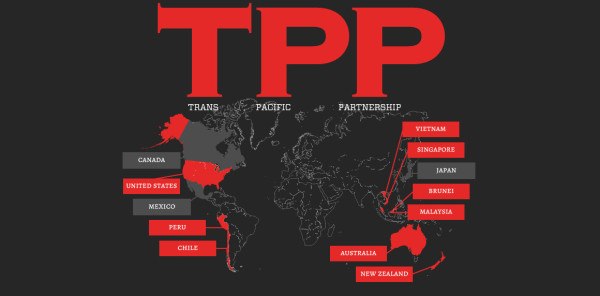US Trade Representative (USTR) Michael Froman (formerly of Citibank) and the trade reps from the other 11 Pacific Rim nations as well as investors from hundreds of multi-national corporations left the luxury resort on the Hawaiian island of Maui on Friday afternoon, July 31st without a deal. Negotiations broke down without concluding the Trans-Pacific Partnership! They announced that no new meetings are scheduled during August. Any delay works against passing the huge deal that means to control global governance as well as commercial interchange. TPP would be the largest “trade” agreement in history, covering 40% of the world’s economy.
Too many issues could not be resolved. Too many public protests oppose relinquishing national sovereignty by allowing a secret agreement to override legal protections for which popular movements have struggled: laws and regulations that protect local agriculture, health & safety, labor rights & human rights & animal rights as well as laws and regulations that protect the environment.
Upcoming elections in the US, Canada and Japan make ignoring public opposition risky for candidates who have been pushing the agreement. In the US, labor and environmental groups are looking for primary challengers to congress members who voted Yes on Fast Track. Except for Gregory Meeks from Queens, NYC Representatives and both Senators voted NO. Democratic Party presidential candidate Bernie Sanders is a fierce opponent of TPP; Hillary Clinton remains silent. Some Republican populists oppose TPP too.
The complicated Trade Promotion Authority (TPA aka Fast Track) legislation passed both chambers of congress at the end of June following a few tense months and close votes. TPA/Fast Track establishes the timetable for one Yes-or-No vote on the entire package of dozens of policy mandates bundled into the TPP.
The calendar starts when the president signs the finished TPP. As finishing and signing are not yet in sight, the process is behind schedule. Congress members are unlikely to see the text of the agreement before mid-2016.
TPA/Fast Track law requires the President give Congress 90 days notice when negotiations are finished and before he signs the deal. Thirty days after the President gives that notification, the text of the agreement must be released to the public. The public gets 60 days to read, analyze and discuss it, and for activists to start getting the word out to larger circles. After 20 hours of debate, with a simple majority in both houses the TPP could pass and create dozens of policies/laws that would radically change our way of life. A similar process is needed in the other 11 nations.
Opponents of the TPP are relieved. As with the Multilateral Agreement on Investment (MAI 1996) and the Free Trade Area of the Americas (FTAA 2001) this one fell apart under its own weight. Nonetheless, no one is naïve enough to declare the struggle is over. Corporate investors mean to make money. They will regroup, as they did after those two setbacks when the Dominican Republic-Central America Free Trade Agreement (DR-CAFTA) and a series of bi-lateral FTAs with Colombia, Panama and South Korea were passed under both Democratic and Republic administrations.
Along with entering the US system as law that sets policy on a multitude of non-trade issues, every FTA off-shores US jobs to lower wage countries, invites imports that compete with things made in the US and contains the odious Investor-State Dispute Resolution mechanism that enables corporations to sue a government that regulates its behavior to protect the population, the planet and the future in a private tribunal. Government regulation is considered by them interference with their right to make an expected profit. The TPP is an investors’ insurance plan.
Trans-Canada is preparing to sue the US government using ISDS in NAFTA (North American Free Trade Agreement 1994) for lost income if the Obama administration prohibits the construction of the Keystone XL pipeline that is scheduled to bring filthy tar sands oil from northern Canada through the mid-west breadbasket to be refined on the Gulf Coast and exported to Asia. TPP would give pharmaceutical corporations extended patent protections that would force generic medicines off the market and cause drug prices to skyrocket. Tobacco companies threaten to use ISDS in TPP to block governments from educating children to the dangers of smoking or helping people to quit.
The Coop’s International Trade Education Squad (ITES) brings you information not available via corporate mass media. We connect through the Sierra Club Responsible Trade Project, Public Citizen Global Trade Watch and TradeJustice Metro NY as well as through a network of contacts who comb alternative sources and email us articles. We post them on our blog – CoopITES.wordpress.com. We hold regular public forums. Non-members are invited. We report regularly to GMs, and we write for the Gazette.
With Brooklyn For Peace and the Park Slope United Methodist Church, ITES sponsored a Town Meeting on Thursday, August 20th – TPP: Free? Fair? Fake? Toxic? The discussion was recorded and will be posted to the blog. The next ITES Public Forum at the Coop will be on Friday evening, September 26th at 6:30 PM in the meeting room. Question, learn, debate, decide and then act. Congressional switchboard is 202-224-3121.










